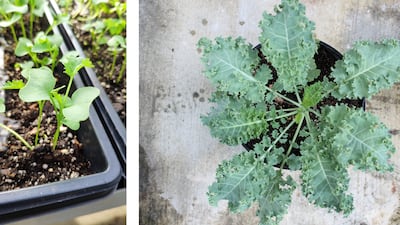The age of the vegetables you eat may play a part in weight loss, a study has suggested.
Very young and very mature vegetables may offer different nutrients, but they might both be effective in limiting weight gain, research shows.
Microgreens, which are positioned between seedlings and baby greens in terms of growth stage, have been touted as potential superfoods.
They are typically harvested within a couple of weeks after they start sprouting, and they can easily be grown in a container on a windowsill.
Microgreens are richer in substances that may offer protection from cancer, tests in mice suggest.
These findings were highlighted at an American Chemical Society hybrid meeting.
Dr Thomas Wang, the project’s lead researcher and a scientist at the Agricultural Research Service of the US Department of Agriculture (USDA), in collaboration with the University of Maryland, College Park, decided to investigate the nutritional offerings of microgreens further.
The research team began their investigations with red cabbage.
They observed that both young and mature cabbage could limit weight gain in mice on a high-fat diet. The nutrient profile of the cabbage varied with its age.
The microgreens exhibited a higher concentration of glucosinolates – nitrogen and sulphur-rich compounds which might protect against cancer.
Their research continued with kale and found striking differences in its nutritional composition.
Immature kale plants contained about five times the amount of glucosinolates compared to their mature versions.
Other studies echoed these findings, suggesting that younger versions of several cruciferous vegetables typically contain higher nutrient levels.
According to Dr Wang, the weight-regulating effects observed in mice might be attributed in part to these vegetables' influence on the microbiome, specifically gut bacteria.
When comparing the biological effects of young kale microgreens to mature kale, both seemed to be effective in curbing weight gain in mice on a high-fat diet. However, there was a more pronounced enhancement in gut bacteria variety with microgreens.
While further research is essential to determine if humans can enjoy these benefits, the findings provide a promising lead for those seeking tasty and nutritious vegetable alternatives.
Dr Wang said: “The scientific literature suggests that cruciferous vegetables, like kale and broccoli, are good for you.
“For those who aren’t fans of broccoli, we're looking to find another vegetable that they might prefer, but that still offers similar health effects.”
Additionally, there is potential in altering the flavour profiles of these vegetables to enhance their appeal.
While some health-boosting components like glucosinolates can be bitter, Dr Wang believes that these compounds might be present in amounts greater than needed for health advantages.
If proven true, breeding could potentially reduce these levels, decreasing associated bitterness and making these greens even more appealing to a broader audience.
Usain Bolt's time for the 100m at major championships
2008 Beijing Olympics 9.69 seconds
2009 Berlin World Championships 9.58
2011 Daegu World Championships Disqualified
2012 London Olympics 9.63
2013 Moscow World Championships 9.77
2015 Beijing World Championships 9.79
2016 Rio Olympics 9.81
2017 London World Championships 9.95
General%20Classification
%3Cp%3E1.%20Elisa%20Longo%20Borghini%20(ITA)%20Trek-Segafredo%3Cbr%3E2.%20Gaia%20Realini%20(ITA)%20Trek-Segafredo%207%20secs%3Cbr%3E3.%20Silvia%20Persico%20(ITA)%20UAE%20Team%20ADQ%201%20min%2018%20secs%3C%2Fp%3E%0A
MATCH INFO
Uefa Champions League semi-final:
First leg: Liverpool 5 Roma 2
Second leg: Wednesday, May 2, Stadio Olimpico, Rome
TV: BeIN Sports, 10.45pm (UAE)
COMPANY%20PROFILE
%3Cp%3E%3Cstrong%3EName%3A%20%3C%2Fstrong%3EKinetic%207%3Cbr%3E%3Cstrong%3EStarted%3A%3C%2Fstrong%3E%202018%3Cbr%3E%3Cstrong%3EFounder%3A%3C%2Fstrong%3E%20Rick%20Parish%3Cbr%3E%3Cstrong%3EBased%3A%3C%2Fstrong%3E%20Abu%20Dhabi%2C%20UAE%3Cbr%3E%3Cstrong%3EIndustry%3A%3C%2Fstrong%3E%20Clean%20cooking%3Cbr%3E%3Cstrong%3EFunding%3A%3C%2Fstrong%3E%20%2410%20million%3Cbr%3E%3Cstrong%3EInvestors%3A%3C%2Fstrong%3E%20Self-funded%3C%2Fp%3E%0A
Global state-owned investor ranking by size
|
1.
|
United States
|
|
2.
|
China
|
|
3.
|
UAE
|
|
4.
|
Japan
|
|
5
|
Norway
|
|
6.
|
Canada
|
|
7.
|
Singapore
|
|
8.
|
Australia
|
|
9.
|
Saudi Arabia
|
|
10.
|
South Korea
|
More from our neighbourhood series:
The specs
- Engine: 3.9-litre twin-turbo V8
- Power: 640hp
- Torque: 760nm
- On sale: 2026
- Price: Not announced yet
The specs: 2018 Chevrolet Trailblazer
Price, base / as tested Dh99,000 / Dh132,000
Engine 3.6L V6
Transmission: Six-speed automatic
Power 275hp @ 6,000rpm
Torque 350Nm @ 3,700rpm
Fuel economy combined 12.2L / 100km
Who's who in Yemen conflict
Houthis: Iran-backed rebels who occupy Sanaa and run unrecognised government
Yemeni government: Exiled government in Aden led by eight-member Presidential Leadership Council
Southern Transitional Council: Faction in Yemeni government that seeks autonomy for the south
Habrish 'rebels': Tribal-backed forces feuding with STC over control of oil in government territory
Islamophobia definition
A widely accepted definition was made by the All Party Parliamentary Group on British Muslims in 2019: “Islamophobia is rooted in racism and is a type of racism that targets expressions of Muslimness or perceived Muslimness.” It further defines it as “inciting hatred or violence against Muslims”.
Specs
Engine: Dual-motor all-wheel-drive electric
Range: Up to 610km
Power: 905hp
Torque: 985Nm
Price: From Dh439,000
Available: Now
Student Of The Year 2
Director: Punit Malhotra
Stars: Tiger Shroff, Tara Sutaria, Ananya Pandey, Aditya Seal
1.5 stars
How to help
Send “thenational” to the following numbers or call the hotline on: 0502955999
2289 – Dh10
2252 – Dh 50
6025 – Dh20
6027 – Dh 100
6026 – Dh 200
Engine: 3.5-litre V6
Transmission: eight-speed automatic
Power: 290hp
Torque: 340Nm
Price: Dh155,800
On sale: now
Blackpink World Tour [Born Pink] In Cinemas
Starring: Rose, Jisoo, Jennie, Lisa
Directors: Min Geun, Oh Yoon-Dong
Rating: 3/5
The Settlers
Director: Louis Theroux
Starring: Daniella Weiss, Ari Abramowitz
Rating: 5/5
Real estate tokenisation project
Dubai launched the pilot phase of its real estate tokenisation project last month.
The initiative focuses on converting real estate assets into digital tokens recorded on blockchain technology and helps in streamlining the process of buying, selling and investing, the Dubai Land Department said.
Dubai’s real estate tokenisation market is projected to reach Dh60 billion ($16.33 billion) by 2033, representing 7 per cent of the emirate’s total property transactions, according to the DLD.
Our legal consultant
Name: Dr Hassan Mohsen Elhais
Position: legal consultant with Al Rowaad Advocates and Legal Consultants.
Who was Alfred Nobel?
The Nobel Prize was created by wealthy Swedish chemist and entrepreneur Alfred Nobel.
- In his will he dictated that the bulk of his estate should be used to fund "prizes to those who, during the preceding year, have conferred the greatest benefit to humankind".
- Nobel is best known as the inventor of dynamite, but also wrote poetry and drama and could speak Russian, French, English and German by the age of 17. The five original prize categories reflect the interests closest to his heart.
- Nobel died in 1896 but it took until 1901, following a legal battle over his will, before the first prizes were awarded.
















